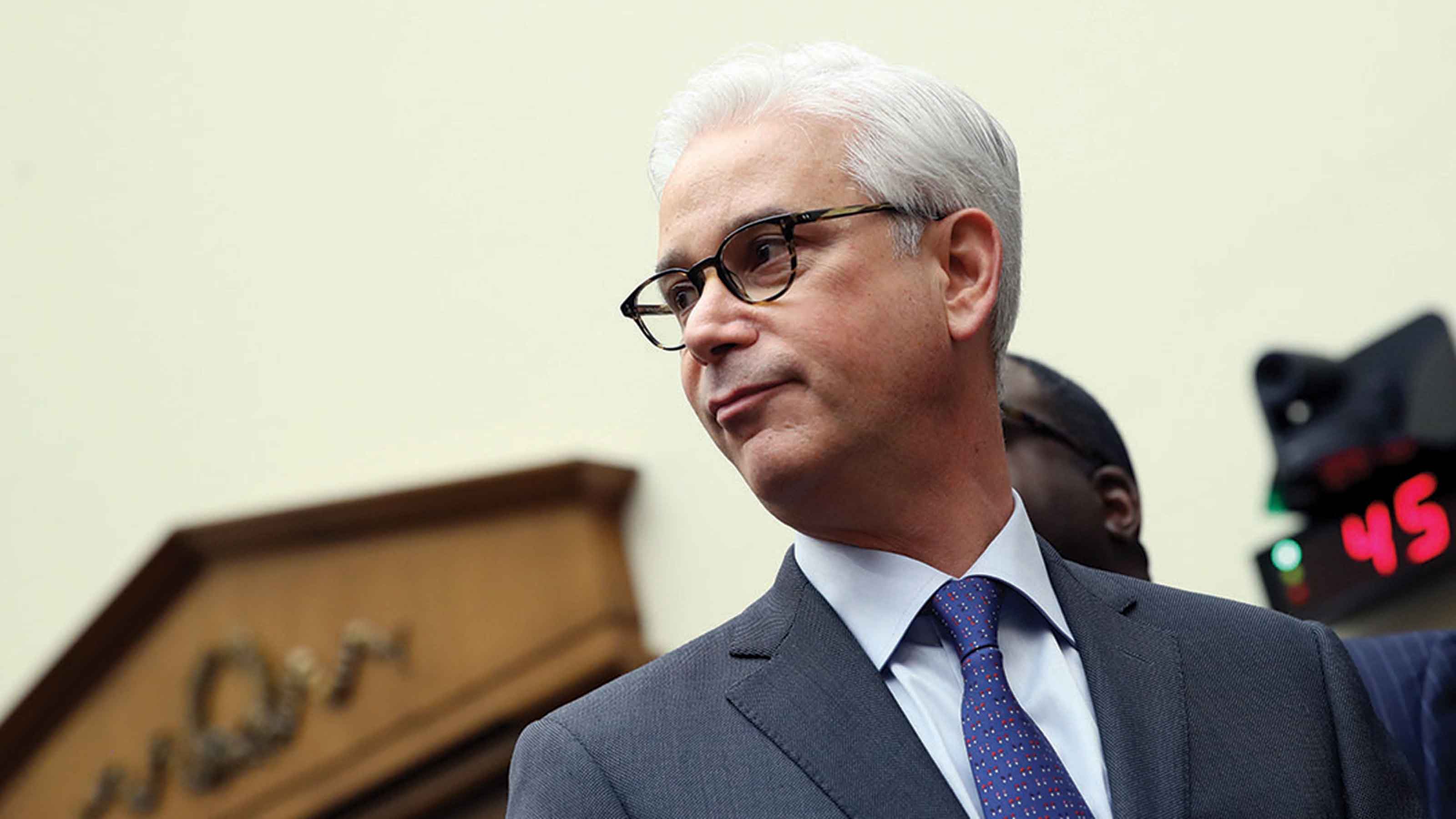Laura Tyson Pushes a Corporate Tax Break
How one former official with a vested interest is pressing fellow Democrats to help corporations.

Profit and prosper with the best of Kiplinger's advice on investing, taxes, retirement, personal finance and much more. Delivered daily. Enter your email in the box and click Sign Me Up.
You are now subscribed
Your newsletter sign-up was successful
Want to add more newsletters?

Delivered daily
Kiplinger Today
Profit and prosper with the best of Kiplinger's advice on investing, taxes, retirement, personal finance and much more delivered daily. Smart money moves start here.

Sent five days a week
Kiplinger A Step Ahead
Get practical help to make better financial decisions in your everyday life, from spending to savings on top deals.

Delivered daily
Kiplinger Closing Bell
Get today's biggest financial and investing headlines delivered to your inbox every day the U.S. stock market is open.

Sent twice a week
Kiplinger Adviser Intel
Financial pros across the country share best practices and fresh tactics to preserve and grow your wealth.

Delivered weekly
Kiplinger Tax Tips
Trim your federal and state tax bills with practical tax-planning and tax-cutting strategies.

Sent twice a week
Kiplinger Retirement Tips
Your twice-a-week guide to planning and enjoying a financially secure and richly rewarding retirement

Sent bimonthly.
Kiplinger Adviser Angle
Insights for advisers, wealth managers and other financial professionals.

Sent twice a week
Kiplinger Investing Weekly
Your twice-a-week roundup of promising stocks, funds, companies and industries you should consider, ones you should avoid, and why.

Sent weekly for six weeks
Kiplinger Invest for Retirement
Your step-by-step six-part series on how to invest for retirement, from devising a successful strategy to exactly which investments to choose.
If you want to understand how influence is wielded in Washington, look at how a coalition of high-tech corporations is using a prominent veteran from the Clinton White House and a Democrat-aligned think tank to try to win a gargantuan tax break most Democrats oppose.
SEE ALSO: What Portion of the Tax Burden Do You Pay?
This isn’t about lobbying, it’s about the way corporations cultivate revered experts, then pay for what appear to be independent judgments that often can be more influential than lobbying. This is standard operating procedure in the nation’s capital, but most cases are difficult to trace.
From just $107.88 $24.99 for Kiplinger Personal Finance
Become a smarter, better informed investor. Subscribe from just $107.88 $24.99, plus get up to 4 Special Issues

Sign up for Kiplinger’s Free Newsletters
Profit and prosper with the best of expert advice on investing, taxes, retirement, personal finance and more - straight to your e-mail.
Profit and prosper with the best of expert advice - straight to your e-mail.
In this case, a couple of dozen giant corporations are spending millions of dollars trying to convince Congress to nearly eliminate, for a year, taxes on $1.4 trillion in profits that corporations have stashed in foreign banks, provided the money is returned to the U.S.
Supporters claim the tax holiday will boost the economy, even if the vast majority of the money is retained by companies and their shareholders. President Obama and most Democrats say the move is an unfair giveaway to the rich, and they cite research on a similar 2004 tax holiday that they say shows it produced few jobs. Opponents say the break would cost the U.S. Treasury hundreds of billions of dollars, but supporters say the losses would be close to zero, since the money would otherwise stay overseas.
On Oct. 13, the New America Foundation stepped into this debate when it issued what it billed as an independent report finding substantially more economic benefit than other research has suggested. The report may be especially persuasive to Democrats, coming from a group that supports the Democratic agenda on health care, energy, immigration, and even boosting income tax rates for the wealthy. Most Republicans support the change, so lining up a few Democrats in the Senate is key.
But New America had nothing to do with the repatriation report, except for agreeing to put its name on the cover. It was produced by corporate consultants under the direction of New America board member Laura D’Andrea Tyson. Tyson, a former Clinton White House economist, also serves on the board of Eastman Kodak, which got a $580 million windfall from the 2004 repatriation holiday and would be one of the biggest beneficiaries of this year’s reprise.
In fact, the report was paid for by the companies lobbying for the change. By working through Tyson and two other organizations, this sponsorship was effectively concealed when the report first came out.
The report predicts the repatriation bill would bring $1 trillion in profits to the U.S. and that this would boost investment roughly $100 to $200 billion. The rest of the money would go to companies and shareholders. Greater investment, plus a small amount of additional spending by shareholders, would boost economic growth by a total of $178 billion to $336 billion over several years.
In an interview, Tyson says any increased growth would be a plus because the trillion dollars will otherwise remain offshore. But former Obama economic adviser Jared Bernstein charges that corporations are gaming the system and shifting profits abroad in anticipation of what is becoming a dependable handout from Uncle Sam. Bernstein argues that this shifting has already contributed to a record low tax take from corporations that would get worse if the break is approved.
Tyson claims a sizable share of the money for shareholders would benefit middle- and lower-income people through pensions and 401K plans. But that’s debatable. Including such indirect stock ownership, the top 10% of households by income own 63% of stocks. The bottom 60% of households, even with 401(k)s, own just 9%.
New America Foundation President Steve Coll said Tyson’s reputation made New America comfortable putting its name on research it didn’t write or review. “She had expertise on this issue, she’s done research on it…and I don’t think anyone has questioned her integrity.” Coll said he wishes he had known more about the report’s funding and that he was unhappy lobbyists were setting up press interviews with Tyson promoting the report.
The tax break is supposed to create jobs but there is no evidence it did so for Kodak. The company has been steadily reducing its U.S. workforce and expanding overseas. After getting $580 million in repatriated profits in 2004, it cut 20,000 U.S. jobs over the next six years.
Tyson says she has been working to pass a repatriation plan since 2009 but had no idea Kodak was one of the companies funding the lobbying effort, called WinAmerica. She contends her personal stake in the fight as a Kodak director is irrelevant, as long as the report’s estimates are accurate. She claims she doesn’t even know how New America came to endorse the report.
Motives aside, it’s hard to believe neither Tyson nor Coll perceive any conflict of interest. Tyson, respected among Democrats, is presenting herself as an objective economist while working directly with lobbyists for companies to pass legislation greatly enriching those firms. She says it was a coincidence that her policy advocacy would provide such a large payoff to the corporation that pays her as a director.
Tyson’s defense is that the report’s economic reasoning is solid, and it is: If you distribute a trillion dollars to corporations and the wealthy, some will spill over to others. In 1992, then-candidate Bill Clinton, who became Tyson’s boss, ridiculed that argument as “trickle-down.” Since then, he has grown wealthy giving speeches to corporate chieftains. And Clinton now supports one version of the repatriation tax break.
Profit and prosper with the best of Kiplinger's advice on investing, taxes, retirement, personal finance and much more. Delivered daily. Enter your email in the box and click Sign Me Up.

-
 How Much It Costs to Host a Super Bowl Party in 2026
How Much It Costs to Host a Super Bowl Party in 2026Hosting a Super Bowl party in 2026 could cost you. Here's a breakdown of food, drink and entertainment costs — plus ways to save.
-
 3 Reasons to Use a 5-Year CD As You Approach Retirement
3 Reasons to Use a 5-Year CD As You Approach RetirementA five-year CD can help you reach other milestones as you approach retirement.
-
 Your Adult Kids Are Doing Fine. Is It Time To Spend Some of Their Inheritance?
Your Adult Kids Are Doing Fine. Is It Time To Spend Some of Their Inheritance?If your kids are successful, do they need an inheritance? Ask yourself these four questions before passing down another dollar.
-
 Airbnb Host Tells What It's Like
Airbnb Host Tells What It's LikeBusiness Costs & Regulation This Denver pharmacist began booking her ski condo a few months after the pandemic hit.
-
 Tough Times for a Family Business
Tough Times for a Family BusinessBusiness Costs & Regulation His dry-cleaning operation was rocked by the pandemic, but he is staying optimistic.
-
 IRS Gives Truckers a Tax Break in Response to the Colonial Pipeline Shutdown
IRS Gives Truckers a Tax Break in Response to the Colonial Pipeline ShutdownTax Breaks The tax penalty for using dyed diesel fuel for highway use is temporarily suspended.
-
 Reliving a Harlem Renaissance
Reliving a Harlem RenaissanceBusiness Costs & Regulation After a tough winter, two sisters look forward to reviving their restaurant’s business.
-
 Add a VPN to Surf the Internet Safely
Add a VPN to Surf the Internet SafelyTechnology To help you fight identity theft, consider adding a VPN.
-
 Stephanie Creary: Making the Case for Diversity on Corporate Boards
Stephanie Creary: Making the Case for Diversity on Corporate BoardsBusiness Costs & Regulation Adding underrepresented voices can improve a company’s bottom line.
-
 Kiplinger's 2020 Election Forecast
Kiplinger's 2020 Election ForecastPolitics For nearly a century, The Kiplinger Letter has forecasted the outcome of presidential elections to keep readers informed of what's coming and what it means for them. Here's our call for 2020.
-
 How We Lose When We Overlook Black Talent
How We Lose When We Overlook Black TalentBusiness Executives Comments from Wells Fargo CEO Charles Scharf (pictured) reflect a culture that tramples on clients’ trust and limits opportunities for people of color.